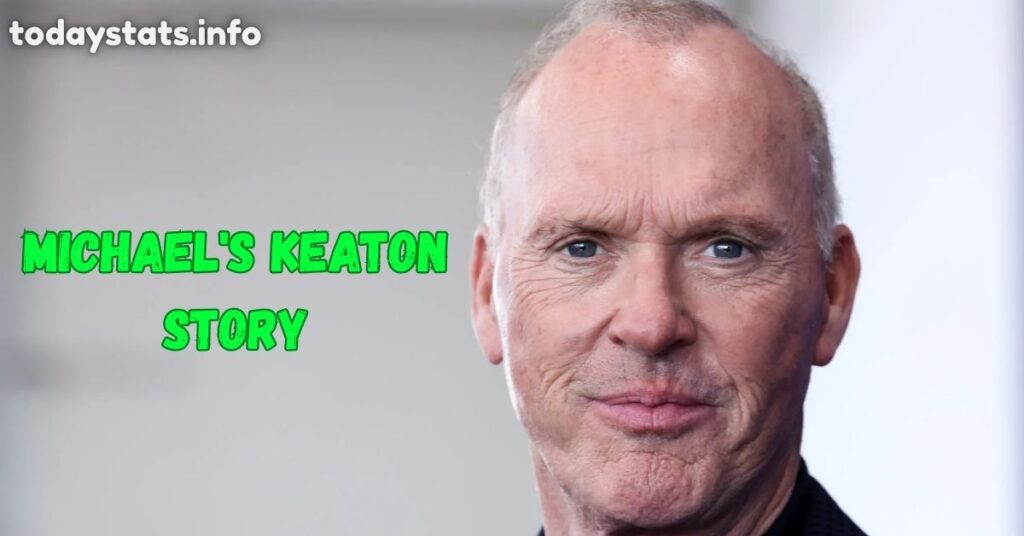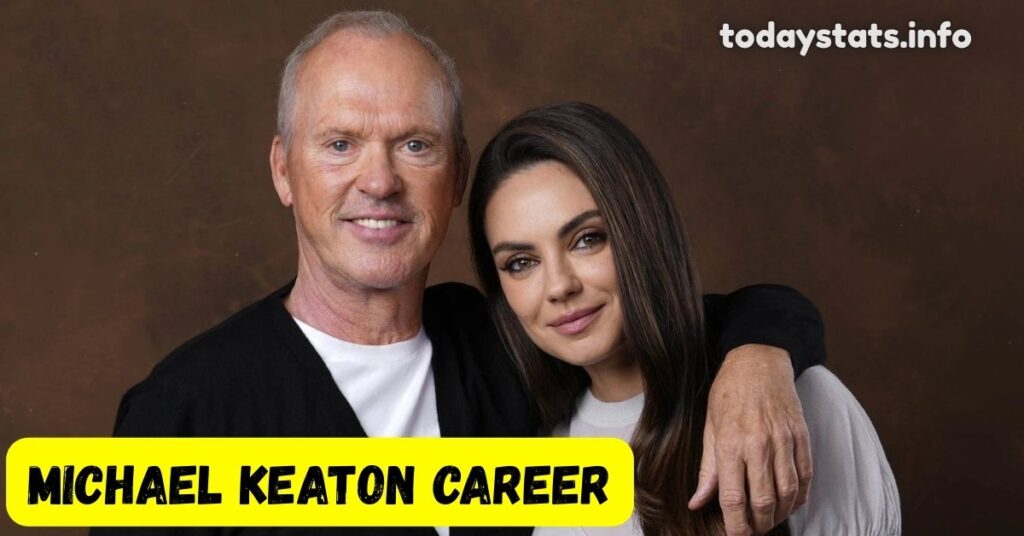Is Michael Keaton sick; rumors about the legendary actor’s health have recently sparked concern among fans. From iconic roles in Batman and Beetlejuice to his powerful recent performances, he has been a dignified person among the Hollywood figures for decades.
But what disease does Michael Keaton suffer from? This query is said to be popping up very frequently online overnight, and it seems many of such people want the truth.
In this article, find all the things relating to Michael Keaton’s health the myth and the reality according to verification sources, and what has been revealed by the actor publicly. Is Michael Keaton suffering from a disease or facing some health issues? Here’s everything we know so far.
Michael’s Keaton Story
He was born Michael John Douglas in Pennsylvania on September 5, 1951, and adopted the stage name Keaton in order to separate himself from the actor Michael Douglas as well as from TV chat host Mike Douglas. He has been doing comedy and serious drama for nearly five decades.

Keaton is famously private and seldom gives details about his life. This has fueled speculation regarding his health status. Actor grow up youngest in a family of seven in a Catholic family of Civil Engineer Surveyor Father and Housewife Mother.
These humble beginnings shaped his work ethic. Prior to fame, a production assistant at “Mister Rogers’ Neighborhood” and turned to stand-up comedy. Such a powerful foundation is as evident throughout his career.
There are some fans who wonder whether this somewhat recluse character is a sign of an illness. However, the dynamic acting he displays day in day out is actually a contradiction of such assumptions. His private lifestyle signifies the type of person he is and not any contradiction to health problems.
Michael Keaton Career
The couturier of movies Keaton stepped into Hollywood as young as 18. Nearly half a century has spanned his career. His various phases reveal how he adapted his talent through time. Let’s look into how this versatile actor traversed his own paths across the entertainment industry while preserving his distinctiveness.

1975 1988: Early career and breakthrough
This was followed by an early stint in sitcoms including Working Stiffs. He became noticed for his natural comedic timing, while making sporadic appearances in comedy films. The sitcom “Working Stiffs” showcasing his talent, was unfortunately too short-lived.
Was in “Night Shift” 1982, which directed Ron Howard: “Playing Bill Blazejowski, an energized morgue attendant full of wild ideas, Keaton easily stole scenes from the star Henry Winkler. On Hollywood’s radar after this.”
“Mr. Mom” did much more than make people laugh. In a time when being a stay-at-home dad was quite revolutionary for male actors, this movie became the benchmark on which further comic ventures would be judged. It led to more comedies in the mid-to-late ’80s, and he made movies like “Johnny Dangerously” and “Gung Ho.”
Tim Burton’s movie “Beetlejuice” (1988) turned everything around. Keaton eruptively played the phantasmical bio-exorcizing ghost in just a brief yet dazzling performance of 17 minutes. It instantly established the character as iconic. Beetlejuice health troubles weren’t really sizable under the fact that Keaton’s slapstick and energy seemed to be without bounds.
1989–1999: Established actor
The casting of Keaton as Batman in Tim Burton’s 1989 film shocked fans and critics. Many doubted the comedic actor could portray the brooding superhero. They were proven wrong as the film broke box office records. Batman actor wellness was evident in his physical preparation for the role.
Keaton reprised his role in “Batman Returns” (1992) with even more intensity. His portrayal balanced Bruce Wayne’s sophistication with Batman’s darkness perfectly. After two films, he walked away from a $15 million offer to continue the role. This decision showed his integrity and selective approach to projects.
The 90s brought varied roles in films like “My Life,” “Much Ado About Nothing,” and “Multiplicity.” Each demonstrated different aspects of his talent. His performance in “The Paper” showed his ability to carry fast-paced dialogue. Jackie Brown” (1997) allowed him to work with director Quentin Tarantino in a supporting role.
During this decade, Keaton maintained a steady workflow without any noticeable health speculation. His energy levels remained consistently high across dramatic and comedic performances. The decade ended with “Jack Frost,” which, despite poor reviews, showcased his emotional range.
2000–2013: Limited roles and venture into voice acting
The early 2000s saw fewer prominent Keaton roles, leading to some actor absence explanation theories. He appeared in smaller films like “First Daughter” and “White Noise.” This career slowdown prompted the first whispers about potential celebrity health speculation.
Voice acting became a significant part of his career during this period. He voiced Chick Hicks in “Cars” (2006) and Ken in “Toy Story 3” (2010). These performances kept him active while being less physically demanding. Some fans wondered if this shift suggested health concerns Michael Keaton might be experiencing.
Guest appearances on shows like “30 Rock” reminded audiences of his comedic talents. His episode as a comically deranged version of himself earned critical praise. Still, his reduced visibility in major film roles continued to fuel speculation about his wellbeing.
2014–2019: Renewed critical success
“Birdman” (2014) marked Keaton’s triumphant return to the spotlight. The meta-role of a former superhero actor seeking artistic validation earned him Golden Globe wins and an Oscar nomination. Birdman star health status questions disappeared as critics marveled at his physically and emotionally demanding performance.
The film’s success catapulted Keaton back to Hollywood’s A-list. “Spotlight” (2015) followed, winning Best Picture and showcasing his subtle acting skills. As Boston Globe editor Walter “Robby” Robinson, he helped expose the Catholic Church abuse scandal. This period dispelled any Hollywood health speculation about the actor.
Blockbusters like “Spider-Man: Homecoming” where he played the villainous Vulture expanded his audience to younger generations. “The Founder” (2016) saw him portray McDonald’s magnate Ray Kroc with calculating precision. These diverse roles required significant energy and focus, contradicting any disease Michael Keaton rumors.
His work in “American Assassin” and “Dumbo” continued to demonstrate his versatility and professional longevity. At an age when many actors slow down, Keaton seemed to be accelerating. His performances required physical stamina that belied any aging actors health concerns that fans might have harbored.
2020 present: Continued acclaim and reprising past roles
Recent years have been remarkably productive for Keaton. “The Trial of the Chicago 7” and “Worth” showcased his dramatic abilities. “Dopesick” on Hulu earned him Emmy and Golden Globe awards for his portrayal of a doctor fighting the opioid crisis. These challenging roles required intense preparation and energy.
2022 saw him return to the role of Batman in “The Flash,” 30 years after his last appearance as the character. This physically demanding role required fitness and stamina that contradicted any actor disease speculation. At over 70 years old, he performed action sequences alongside much younger actors.
The long-awaited “Beetlejuice Beetlejuice” sequel brought him back to one of his most beloved characters in 2024. His manic energy matched his original performance from 36 years earlier. No Beetlejuice health concerns were evident as he bounced around sets with his trademark intensity.
His continued productivity suggests excellent Keaton health status. Upcoming projects include “Goodrich” and “Knox Goes Away” showing no signs of slowing down. His professional commitments and performance quality strongly counter any celebrity illness rumors that occasionally surface online.
READ THIS BLOG: Renni Rucci Net Worth: A Deep Dive into Her Success and Wealth
Health Concerns Surrounding Michael Keaton
Despite persistent internet searches about Michael Keaton health, no credible reports confirm any serious illness. Celebrities often face unfounded health privacy Hollywood violations through gossip and speculation. Keaton has been particularly targeted due to his private nature.
Some fans mistakenly associated his career lulls with potential health issues. The reality seems to be selective role choices rather than any film star medical condition. His energy in interviews and on set remains high even in his seventies. Directors consistently praise his work ethic and stamina.
His occasional absences from red carpet events fueled some media speculation health concerns. However, Keaton has always been selective about public appearances even at the height of his fame. This consistency suggests personality preference rather than health limitations.
Recent promotional appearances for “Beetlejuice Beetlejuice” showed him vibrant and engaged. His movement, speech, and cognitive abilities appear completely normal for his age. These public appearances contradict any Hollywood star health decline rumors that periodically surface online.
What Sparked the Speculations?
Several factors have contributed to unfounded actor illness rumors about Keaton. Understanding these can help separate fact from fiction when evaluating celebrity health information.
The intense characters Keaton portrays sometimes create character portrayal health confusion. In “Birdman,” his character experienced mental health challenges that some viewers conflated with the actor himself. His convincing performance in “Dopesick” similarly led some to wonder if he had personal experience with health struggles.
Keaton’s age-related health assumptions play a significant role in speculation. At 73, some fans automatically assume health issues must exist simply because of his age. This ageist perspective ignores many active, healthy seniors in and outside of Hollywood. His performances require physical and mental sharpness that contradict such assumptions.
His selective approach to roles and publicity has fueled actor absence explanation theories. Unlike many celebrities who maintain constant visibility, Keaton disappears between projects. This intentional privacy creates information vacuums that rumor mills eagerly fill with health speculation.
The internet’s algorithm-driven content creates self-reinforcing health misinformation actors often face. Once people search for “Michael Keaton disease,” more content appears speculating about his health. This creates the false impression of widespread concern where none is justified by facts.
Addressing the Rumors
No credible sources support claims about any disease Michael Keaton might have. His representatives have never confirmed any serious health conditions. The actor continues working steadily on demanding projects that would be impossible with significant illness.
Keaton’s physical appearance remains relatively unchanged. While showing normal signs of aging, he maintains good muscle tone and mobility. His speech patterns in interviews remain clear and articulate. These observations counter rumor debunking health concerns that occasionally circulate.
His work schedule would be impossible for someone battling serious illness. In recent years, he’s completed multiple films and television series annually. Such productivity contradicts any medical condition actor speculation. The physical demands of his recent Batman and Beetlejuice reprisals required exceptional fitness.
Many celebrities face health verification celebrity challenges as public curiosity invades private medical matters. Keaton deserves the same medical privacy as anyone else. Without confirmation from the actor or his representatives, all health speculation remains unsubstantiated gossip.
Michael Keaton’s Contribution to Health Awareness
While not publicly battling illness himself, Keaton has contributed significantly to health awareness through his work. His portrayal of Dr. Samuel Finnix in “Dopesick” brought critical attention to America’s opioid awareness crisis. This performance helped educate millions about prescription drug addiction’s devastating impact.
His Dopesick advocacy extended beyond his performance. In interviews promoting the series, Keaton shared that he lost a nephew to fentanyl overdose. This personal connection informed his passionate performance and public statements about addiction’s impact on families.
Through the Michael J. Fox Foundation, Keaton has supported Parkinson’s disease research. His friendship with Fox exemplifies his commitment to supporting others facing health challenges. This quiet philanthropy demonstrates his character without seeking publicity.
Mental health awareness benefits from Keaton’s nuanced portrayals of complex characters. His “Birdman” performance depicted depression and identity crisis with sensitivity and depth. Such representations help normalize discussions about psychological wellbeing.
READ THIS BLOG: Toni Breidinger’s Husband: Racing, Resilience, and the Road Ahead
Why It’s Important to Respect Privacy?
Celebrity medical privacy deserves the same protection as anyone else’s health information. The public’s curiosity never outweighs an individual’s right to confidentiality about personal matters. Public figure privacy boundaries protect basic human dignity.
Speculation about health concerns Michael Keaton might face creates unnecessary anxiety for fans and potentially the actor himself. Unfounded rumors can spread rapidly online, creating false narratives that may be distressing. Respect means acknowledging the difference between public interest and public right to know.
Private lifestyle celebrity choices often reflect personal values rather than hidden problems. Keaton’s selective public appearances and interviews demonstrate professionalism and boundaries. These choices protect his creative energy and personal relationships from excessive scrutiny.
Consider how invasive health speculation would feel if directed at you or your loved ones. This empathy should guide our approach to celebrities’ personal matters. Hollywood health speculation often crosses ethical lines that wouldn’t be acceptable in other contexts.
Frequently Asked Questions
Does Michael Keaton have a disease?
No confirmed information suggests Michael Keaton has any disease or chronic illness. His active career and energetic performances contradict such speculation.
Why do people think Michael Keaton is sick?
His private nature, selective career choices, age, and intense character portrayals have fueled unfounded speculation. Online algorithms amplify these rumors once people begin searching for health-related terms.
Is Michael Keaton still active in Hollywood?
Absolutely. Keaton remains very active with major roles in recent films like “The Flash” and “Beetlejuice Beetlejuice” plus award-winning TV work in “Dopesick.” His upcoming projects show continued professional momentum.
Has Michael Keaton spoken about his health?
Keaton rarely discusses personal health matters publicly, maintaining appropriate boundaries between his professional and private life. No major health announcements have come from him or his representatives.
What can fans do to support Michael Keaton?
Appreciate his work, respect his privacy, avoid spreading unverified rumors, and support causes he champions like opioid crisis awareness. Focus on his artistic contributions rather than unfounded speculation.
Conclusion
The question “What disease does Michael Keaton have?” appears based entirely on speculation rather than facts. The actor’s private lifestyle has protected his personal information while fueling curiosity.
At 73, Keaton demonstrates remarkable Batman actor wellness through his continued high-level performances. His energy playing Beetlejuice again after 36 years wouldn’t be possible for someone battling significant illness.
Rather than focusing on unfounded rumors, fans should celebrate Keaton’s extraordinary career renaissance. His legacy isn’t about hidden health struggles but about artistic excellence across five decades in Hollywood.
His work speaks for itself through characters that have become cultural touchstones – an achievement that deserves our attention far more than baseless health speculation.

Smith is a seasoned SEO expert with a passion for content writing, keyword research, and web development. He combines technical expertise with creative strategies to deliver exceptional digital solutions.






